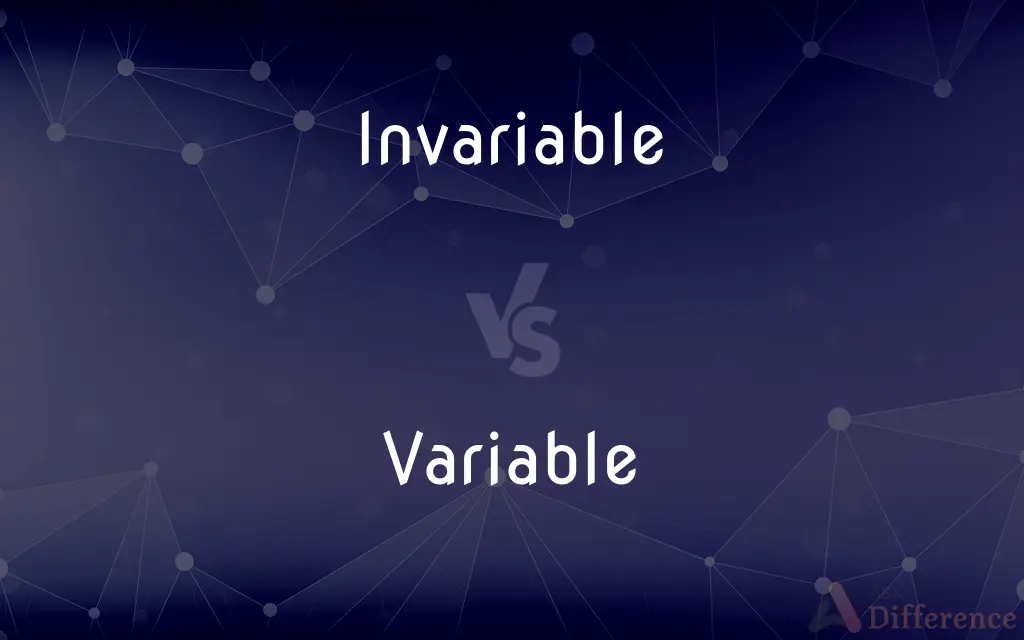Invariable vs. Variable — What's the Difference?
Edited by Tayyaba Rehman — By Urooj Arif — Updated on April 28, 2024
"Invariable" describes something that does not change and remains constant, whereas "variable" refers to something that can change or vary, often in response to different conditions or factors.

Difference Between Invariable and Variable
Table of Contents
ADVERTISEMENT
Key Differences
Invariable refers to elements or conditions that remain constant over time and do not change under different circumstances. It is often used to describe laws, principles, or characteristics that are seen as permanent and unalterable. On the other hand, variable pertains to things that can change, fluctuate, or be adjusted according to different situations or inputs.
While invariable properties ensure consistency and predictability, such as in scientific constants or fixed routines, variable properties introduce flexibility and adaptability, which can be crucial in dynamic environments or experiments. Variables allow for adjustments based on outcomes, feedback, or external conditions.
In the context of mathematics or science, an invariable might refer to a constant value in an equation, such as the speed of light in vacuum, which is crucial for precise calculations and theories. Conversely, a variable in the same fields would be a quantity that can assume any value in a given set, crucial for solving problems and modeling real-world phenomena.
In practical applications, invariable components are those that businesses or systems rely on to maintain stability and reliability, such as standard operating procedures or core policies. Variables, however, might include fluctuating market conditions, customer preferences, or resource availability, which require ongoing assessment and response.
Understanding whether elements of a system are invariable or variable helps in planning and strategy. Invariable elements provide a foundation and certainty, while variable elements challenge entities to remain responsive and innovative, adapting to new information or changing circumstances.
ADVERTISEMENT
Comparison Chart
Definition
Constant and unchanging
Capable of change or variation
Role in Systems
Provides stability and predictability
Introduces flexibility and adaptability
Example in Science
Speed of light (constant)
Temperature (changes with conditions)
Usage in Business
Core policies, fixed costs
Market trends, pricing strategies
Importance
Ensures reliability and consistency
Allows adjustment to new conditions
Compare with Definitions
Invariable
Always the same, fixed.
The restaurant’s quality is invariable, always excellent.
Variable
Something that may vary.
Dress codes at the office are variable depending on the day.
Invariable
Unchanging over time or circumstance.
The laws of physics are considered invariable.
Variable
Able to be changed or adapted.
Variable interest rates can fluctuate over time.
Invariable
Uniform across cases.
The uniform color code at work is invariable.
Variable
Differing in type, amount, or degree.
Variable weather conditions affected the event.
Invariable
Constant, without variation.
His routine is invariable, starting every day at 6 AM.
Variable
Changeable aspect of an experiment.
The variable being tested in the study was light exposure.
Invariable
Perpetual or unalterable.
Her cheerful mood seems almost invariable.
Variable
Not consistent or having fixed patterns.
His work hours are highly variable.
Invariable
Not changing or subject to change; constant.
Variable
Likely to change or vary; subject to variation; changeable.
Invariable
Not variable; unalterable; uniform; always having the same value.
Variable
Inconstant; fickle.
Invariable
(math) Constant.
Variable
(Biology) Tending to exhibit genetic variation or variation in a physical trait
Geographically variable color patterns.
Invariable
That cannot undergo inflection, conjugation or declension.
The French adjective marron ‘brown’ is invariable: it does not take the usual s in the plural.
Variable
(Mathematics) Having no fixed quantitative value.
Invariable
Something that does not vary; a constant.
Variable
Something that varies or is prone to variation.
Invariable
Not given to variation or change; unalterable; unchangeable; always uniform.
Physical laws which are invariable.
Variable
(Astronomy) A variable star.
Invariable
An invariable quantity; a constant.
Variable
A quantity capable of assuming any of a set of values.
Invariable
Not liable to or capable of change;
An invariable temperature
An invariable rule
His invariable courtesy
Variable
A symbol representing such a quantity. For example, in the expression a2 + b2 = c2, a,b, and c are variables.
Variable
Able to vary or be varied.
Variable winds or seasons; a variable quantity; a variable resistor
Variable
Likely to vary.
Variable
Marked by diversity or difference.
Variable
(mathematics) Having no fixed quantitative value.
Variable
(biology) Tending to deviate from a normal or recognized type.
Variable
Something that is variable.
Variable
Something whose value may be dictated or discovered.
There are several variables to consider here.
Variable
(mathematics) A symbol representing a variable.
Variable
(programming) A named memory location in which a program can store intermediate results and from which it can read them.
Variable
(astronomy) A variable star.
Variable
(nautical) A shifting wind, or one that varies in force.
Variable
Those parts of the sea where a steady wind is not expected, especially the parts between the trade-wind belts.
Variable
Having the capacity of varying or changing; capable of alternation in any manner; changeable; as, variable winds or seasons; a variable quantity.
Variable
Liable to vary; too susceptible of change; mutable; fickle; unsteady; inconstant; as, the affections of men are variable; passions are variable.
Lest that thy love prove likewise variable.
His heart, I know, how variable and vain!
Variable
That which is variable; that which varies, or is subject to change.
Variable
A quantity which may increase or decrease; a quantity which admits of an infinite number of values in the same expression; a variable quantity; as, in the equation x2 - y2 = R2, x and y are variables.
Variable
A shifting wind, or one that varies in force.
Variable
Something that is likely to vary; something that is subject to variation;
The weather is one variable to be considered
Variable
A quantity that can assume any of a set of values
Variable
A star that varies noticeably in brightness
Variable
A symbol (like x or y) that is used in mathematical or logical expressions to represent a variable quantity
Variable
Liable to or capable of change;
Rainfall in the tropics is notoriously variable
Variable winds
Variable expenses
Variable
Marked by diversity or difference;
The varying angles of roof slope
Nature is infinitely variable
Variable
(used of a device) designed so that a property (as e.g. light) can be varied;
A variable capacitor
Variable filters in front of the mercury xenon lights
Common Curiosities
What makes a characteristic invariable?
A characteristic is invariable if it does not change regardless of external conditions or over time.
Can a variable become invariable?
In certain contexts, what was once variable can be standardized or controlled to become effectively invariable, such as setting a fixed process in a previously flexible system.
Why is it important to distinguish between invariable and variable in planning?
Distinguishing between these helps in forecasting and strategy, ensuring that stable elements are relied upon while adaptable elements are optimized for responsiveness.
How do variables impact scientific research?
Variables in scientific research allow scientists to test hypotheses, explore relationships, and draw conclusions about changing conditions.
How do variables affect financial planning?
Variables in financial planning, like interest rates or market dynamics, require ongoing monitoring and adjustment to ensure effective management of resources and risks.
Is weather considered a variable or invariable?
Weather is considered a variable because it changes and can vary significantly over time and between different locations.
Are moral principles considered invariable?
Moral principles are often considered invariable in certain philosophical or cultural contexts, regarded as universal truths or standards.
What is an example of an invariable in everyday life?
An example of an invariable could be the 24-hour length of a day, which does not change and upon which people base their daily schedules.
How does recognizing variables benefit a business?
Recognizing variables allows a business to adapt strategies that accommodate or leverage changing circumstances for competitive advantage.
Can legal rules be invariable?
While some legal rules can remain largely unchanged and are considered invariable, laws can also be amended or updated, introducing variability based on societal needs or new information.
Share Your Discovery

Previous Comparison
Sandwich vs. Burger
Next Comparison
Sap vs. SipAuthor Spotlight
Written by
Urooj ArifUrooj is a skilled content writer at Ask Difference, known for her exceptional ability to simplify complex topics into engaging and informative content. With a passion for research and a flair for clear, concise writing, she consistently delivers articles that resonate with our diverse audience.
Edited by
Tayyaba RehmanTayyaba Rehman is a distinguished writer, currently serving as a primary contributor to askdifference.com. As a researcher in semantics and etymology, Tayyaba's passion for the complexity of languages and their distinctions has found a perfect home on the platform. Tayyaba delves into the intricacies of language, distinguishing between commonly confused words and phrases, thereby providing clarity for readers worldwide.













































